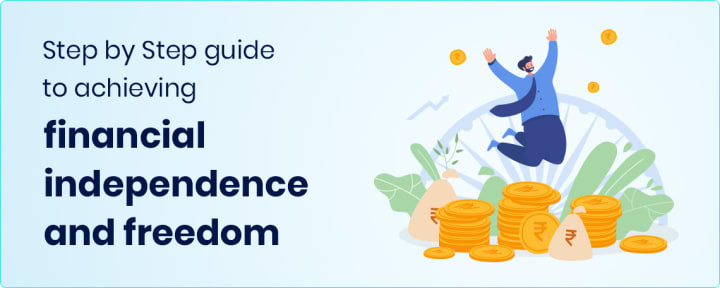
Achieving financial freedom can be a long and challenging journey, but it is an achievable goal with the right mindset and strategies. Here are some tips and tricks for reaching financial independence:
Set clear financial goals:
Setting clear financial goals is an important step towards achieving financial independence. Here are some tips to help you set effective financial goals:
- Identify your priorities: Start by identifying your financial priorities. This may include paying off debt, saving for a down payment on a home, or investing in your retirement.
- Be specific: Set specific goals that are measurable and time-bound. For example, instead of saying "I want to save more money," set a specific goal such as "I want to save $10,000 in the next year."
- Break down big goals into smaller ones: If you have a big financial goal, break it down into smaller, more manageable goals. This will help you stay motivated and on track.
- Make your goals realistic: Your financial goals should be challenging, but also realistic. Avoid setting goals that are too ambitious or unachievable, as this can be demotivating.
- Write them down: Write down your financial goals and keep them in a visible place, such as on your fridge or on your desk. This will help you stay focused and remind you of what you are working towards.
- Review and adjust your goals regularly: Review your financial goals regularly and make adjustments as needed. Your goals may change as your financial situation changes, and that's okay.
By setting clear financial goals, you will be better able to prioritize your spending, make informed financial decisions, and ultimately achieve financial independence.
Create a budget and stick to it:
Creating a budget is an essential step towards achieving financial independence. Here are some tips to help you create a budget and stick to it:
- Track your income and expenses: Start by tracking your income and expenses for a month. This will help you understand where your money is going and identify areas where you can cut back.
- Categorize your expenses: Categorize your expenses into fixed and variable expenses. Fixed expenses are recurring expenses that do not change, such as rent or car payments, while variable expenses are expenses that can fluctuate, such as groceries or entertainment.
- Set spending limits: Set spending limits for each category of expenses and stick to them. This will help you avoid overspending and stay within your budget.
- Prioritize your spending: Prioritize your spending based on your financial goals. For example, if your goal is to pay off debt, prioritize your debt payments over discretionary spending.
- Use budgeting tools: Use budgeting tools such as spreadsheets or budgeting apps to help you track your spending and stay on track.
- Review and adjust your budget regularly: Review your budget regularly and make adjustments as needed. Your income and expenses may change over time, and it's important to keep your budget up-to-date to ensure you are on track to achieving your financial goals.
By creating a budget and sticking to it, you will be better able to manage your finances, reduce your expenses, and ultimately achieve financial independence.
Reduce your expenses:
Reducing your expenses is a key part of achieving financial independence. Here are some tips to help you reduce your expenses:
- Cut back on discretionary spending: Look for ways to cut back on discretionary spending, such as eating out less, cancelling subscriptions you don't use, or reducing your entertainment expenses.
- Shop around for better deals: Shop around for better deals on your monthly bills, such as your phone or internet bill. You may be able to find a better deal with a different provider.
- Use coupons and discounts: Use coupons and discounts when shopping for groceries or other items. You can find coupons online or in your local newspaper.
- Buy in bulk: Buying in bulk can help you save money on groceries and other household items. Just be sure to only buy what you will actually use.
- Use public transportation or carpool: Consider using public transportation or carpooling to work or other activities to save money on gas and maintenance expenses.
- Negotiate your bills: Negotiate your bills with service providers such as your cable or internet company. You may be able to get a better deal by simply asking for one.
- DIY instead of hiring someone: Look for ways to do things yourself instead of hiring someone, such as cleaning your own home instead of hiring a cleaning service.
By reducing your expenses, you will be able to save more money and put it towards achieving your financial goals. It's important to remember that small changes can add up over time, so even small reductions in your expenses can have a significant impact on your finances.
Build an emergency fund:
Building an emergency fund is an important step towards achieving financial independence. Here are some tips to help you build an emergency fund:
- Set a savings goal: Determine how much you need to save for emergencies. A good rule of thumb is to have three to six months' worth of living expenses saved.
- Start small: If you don't have a lot of extra money to save, start small. Set a goal to save $500 or $1,000, and then work your way up from there.
- Make it automatic: Set up automatic transfers from your checking account to your savings account each month. This will help you save consistently without having to think about it.
- Cut back on unnecessary expenses: Look for ways to cut back on unnecessary expenses, such as eating out less or cancelling subscriptions you don't use. Use the money you save to build your emergency fund.
- Use windfalls to boost your savings: If you receive a bonus at work or a tax refund, use that money to boost your emergency fund.
- Keep your emergency fund separate: Keep your emergency fund in a separate savings account from your other savings. This will help you avoid spending the money on non-emergency expenses.
- Don't touch your emergency fund unless it's an emergency: Only use your emergency fund for true emergencies, such as unexpected medical expenses or job loss.
By building an emergency fund, you will have a financial safety net that can help you weather unexpected expenses or income interruptions. This can help you avoid going into debt and stay on track towards achieving financial independence.

Pay off high-interest debt:
Paying off high-interest debt is an important step towards achieving financial independence. Here are some tips to help you pay off your high-interest debt:
- Make a plan: Create a plan for paying off your debt, including how much you will pay each month and when you expect to be debt-free.
- Focus on high-interest debt first: Focus on paying off your high-interest debt first, such as credit card debt. High-interest debt can quickly accumulate and make it difficult to pay off.
- Consider consolidation: Consider consolidating your debt into a single loan with a lower interest rate. This can help you save money on interest and make it easier to manage your debt.
- Make extra payments: Make extra payments towards your debt whenever you can. This will help you pay off your debt faster and save money on interest.
- Cut back on expenses: Look for ways to cut back on your expenses so you can put more money towards paying off your debt. This might include reducing your discretionary spending or finding ways to save on your monthly bills.
- Use windfalls to pay down debt: If you receive a windfall, such as a bonus at work or a tax refund, use that money to pay down your debt.
- Stay motivated: Staying motivated can be challenging when you're paying off debt, but it's important to stay focused on your goal. Celebrate your progress along the way, and remind yourself of why you're working to become debt-free.
By paying off your high-interest debt, you will reduce your monthly expenses, save money on interest, and free up more money to put towards your financial goals. This will put you on the path towards achieving financial independence.
Invest in your future:
Investing in your future is an important step towards achieving financial independence. Here are some tips to help you get started:
- Start early: The earlier you start investing, the more time your money has to grow. Even small investments made early on can compound over time and lead to significant wealth accumulation.
- Take advantage of employer-sponsored plans: If your employer offers a 401(k) or other retirement plan, take advantage of it. Contribute as much as you can, especially if your employer offers matching contributions.
- Open an IRA: If you don't have access to an employer-sponsored retirement plan, consider opening an Individual Retirement Account (IRA). You can contribute up to $6,000 per year (as of 2023) to an IRA.
- Diversify your investments: Diversification can help reduce your risk and maximize your returns. Consider investing in a mix of stocks, bonds, and other assets.
- Consider professional help: If you're new to investing, consider working with a financial advisor or planner who can help you create an investment strategy that aligns with your goals and risk tolerance.
- Invest consistently: Consistency is key when it comes to investing. Make it a habit to contribute to your investments regularly, even if it's just a small amount.
- Stay informed: Stay up-to-date on market trends and news that could impact your investments. This will help you make informed decisions about your portfolio.
By investing in your future, you will build wealth and put yourself on the path towards achieving financial independence. It's important to remember that investing involves risk, and it's important to do your research and seek professional advice when needed.
Educate yourself about personal finance:
Personal finance is the management of one's financial resources, including income, expenses, investments, and debt. It is important for everyone to educate themselves about personal finance to make informed decisions and achieve financial stability and security. Here are some key topics to consider when learning about personal finance:
- Budgeting: A budget is a plan for managing your income and expenses. It helps you to identify your income sources, prioritize your expenses, and manage your cash flow. Creating and sticking to a budget is an essential step in achieving financial goals.
- Saving and investing: Saving money is important for building an emergency fund, paying off debt, and achieving long-term financial goals. Investing is a way to grow your wealth over time. Understanding different types of investments and their risks and returns can help you make informed investment decisions.
- Debt management: Managing debt is crucial for maintaining financial stability. Learning about different types of debt, such as credit card debt, student loans, and mortgages, can help you develop a plan to pay off your debt and avoid falling into debt traps.
- Retirement planning: Planning for retirement is important to ensure that you have enough money to support yourself in your golden years. Understanding different retirement savings options, such as 401(k) plans and individual retirement accounts (IRAs), can help you plan for a comfortable retirement.
- Taxation: Taxes are a necessary part of personal finance. Understanding different types of taxes, such as income taxes, property taxes, and sales taxes, can help you minimize your tax burden and maximize your financial resources.
- Insurance: Insurance is an important tool for protecting your financial assets. Understanding different types of insurance, such as health insurance, life insurance, and home insurance, can help you choose the right coverage to protect yourself and your family.
By educating yourself about these key topics, you can make informed decisions about your personal finances and achieve financial stability and security.
Remember that achieving financial freedom takes time and effort, but with the right strategies and mindset, you can reach your goals and enjoy a secure financial future.
THANKS FOR READING MY ARTICLES.
DON'T FORGET TO SUBSCRIBE.





Comments
There are no comments for this story
Be the first to respond and start the conversation.